Lovebirds are one of the most commonly petted parrots across the globe. And as we are reading here, many parrot lovers are already thinking about bringing one home. The most important factor that helps them all in making this desire a possibility is knowing all about how the bird might behave in captivity.
It is only after knowing all the behavioral probabilities, one should go ahead in adopting a lovebird. This is an honest judgment of self capability of raising a pet parrot. So, let’s know all the behavioral traits of a lovebird, the reasons behind them all, and ways to handle them.
How lovebird Behaves when Happy
Affectionate
Lovebirds are known for their affectionate and loving behavior. Their affectionate behavior towards their ‘mates’ has earned them the name in the first place. If that mate happens to be another lovebird, they would affectionately regurgitate food to them, preen them, chirp sweet nothings to them and spend every second of the day with them.
And if that mate is their human parent, they would sing, chirp, play hide-n-seek, snuggle in their neck/arms, and do every possible affectionate thing a companion would do. Also, statistically, male lovebirds have been reported to be more affectionate when compared to their female counterparts.
Playful
This would be the commonest behavioral display of any lovebird if he has been keeping happy about his stay in captivity. Spotting the playful behavior in a lovebird is easy. Look if the bird is whistling, singing, chirping, trying to mimic sounds from the surroundings, or chattering softly. They are just being playful and are simply immersed in their little goofy world.
Stretching and flapping wings are also an extension of their playful behavior. Only content and playful lovebirds would stretch and flap their wings to add more entertainment to his happy times. Some would just move their shoulders up and down or hang themselves upside down as they would do in the wild. These are all behaviors of a playful lovebird.
Extra chattery
A super chatty lovebird is a happy lovebird. The extra chirpiness is a positive behavioral trait of a lovebird and there is nothing to worry about. It doesn’t need any correction. That said, do not confuse the chattiness with screeches.
Preening
Preening is a part of normal behavior and any lovebird would love to preen himself if he’s happy or more so, not depressed. In case, there is a pair of lovebirds inside the cage and they happen to be the bonded ones, they’d often preen each other. The problem arises only when a lovebird doesn’t preen himself. It is a clear sign of a lonely and depressed bird.
Tongue clicking
This behavior is often noticed in happy lovebirds. Lovebirds also click their tongues while entertaining themselves. It may also mean that they want to be petted and come out of the cage to play with their ‘human mate’. To keep the bird in the same high spirits, reach out to him and try to understand the message he might be conveying.
Bored Lovebird Behavior
Chewy
They’re at their best ‘chewy’ behavior when bored. A lonely lovebird is a nibbling lovebird. These birds are infamous for chewing almost anything they get their beaks on. Electric wires, phone cases, rubber items, phones, laptops, jewelry, owner’s clothes, and maybe the weirdest of all, light bulbs. Also, they very often pull out the buttons of everything.
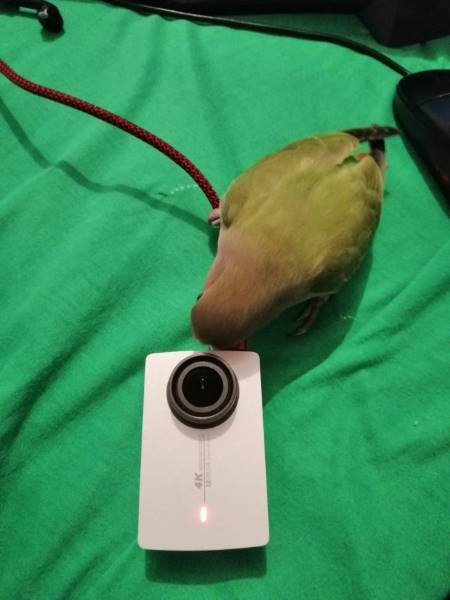
Helpful tip: To keep this little bird from chewing off the whole house, add a lot of entertainment in his life. Do not make him feel lonely or bored. Spend quality time with him. And while doing so, keep a soft toy handy to let him play with something. Or maybe put on music so that he can be distracted to whistle or chirp.
Tail wagging
This is another behavior of the lovebird that he might display while he’s searching for something to do. Lovebirds often wag their tails while they switch from one activity to another but they aren’t feeling entertained by any of it all. They would just wag their tail and try to do something else that might kill their boredom. That said, this tail-wagging should be identified separately from the tail wagging done in sickness/uneasiness.
Helpful tip: To help the lovebird kill the boredom, pay attention to him. As an immediate solution, switch on his favorite music. Or if the bird is bonded well with you, bring him out of the cage to spend some quality time with him while snuggling. For a more permanent solution, add new toys to avoid similar times.
Lovebird Sick behavior
Silent
No behavior or doing/saying nothing at all; is the worst behavior a sick lovebird can exhibit. And it generally is a sign that the sickness has gotten onto a level that needs urgent medical attention.
Helpful tip: Note if the lovebird is denied entertainment. The silence may be a step towards depression. Add a great amount of entertainment and start spending one-on-one time with the bird. If the condition persists even after 3-4 days of the positive change, it is time to visit the vet.
Hydrophobia
A lovebird who is avoiding getting into water unusually might indicate a behavior only sick birds would do. Just like humans, birds also hate to get into a water tub when feeling low or sick. That said, it should not be confused with a general dislike or fear of bath.
Helpful tip: To be sure that the lovebird’s fear of water is not general, try adopting unique ways of getting him to the bath. Misting; preparing a bathing bowl with lettuce leaves and colorful beads, are few that work mostly. But if the fear is unusual, it’s time to consult a vet.
Erratic
If the lovebird displays erratic behavior, then it is most likely a sign of him being sick and suffering silently. Where visible signs like drooping eyes, ruffles feathers, or running nose are apparent to call the bird sick, some symptoms may not be so clear to identify the sickness immediately. Misjudging a sick lovebird as ‘simply bored’ might have consequences. Hence, it is always imperative to judge and act right. Some of the symptoms could be excessive scratching, screaming, growling, unusual aggression, dropping off the perch, tail bobbing, odd breathing, et al.
Helpful tip: If such erratic behavior doesn’t go away in 4-5 days of extending pure love and care to the bird, waste no time to see the vet.
Lovebird Breeding Behavior
Territorial
One of the most common behavioral traits witnessed by the lovebird owners is their strong ‘feelings of owning the territory’. This territorial behavior in lovebirds is generally seen during the breeding season. The behavior tends to subside as the breeding season ends. Again, statistically, female lovebirds love to boss around their nesting sites and don’t let anyone around. Some lovebirds also like to tap their feet to let others know the range of their territory. Anyone trespassing might get attacked by the guardian bird.
Read More about Breeding here.
Helpful tip: The best remedy to keep the lovebirds from acquiring the territorial behavioral traits is to end the existence of such a territory. If it is not breeding season, do not let the birds make a nesting site or cavity. And with the end of the breeding season, remove the nest box slowly and carefully.
Biting
Territorial or not, lovebirds often get aggressive as the breeding season approaches. This aggression is often expressed with harsh bites towards the owner. More often than not, bites in such times are so strong that they can cause bleeding hands. And the fluctuating hormones are to be blamed. The behavior is thought to be normal and tends to go away with the season. Reports suggest that even the gentlest and non-nippy lovebirds suddenly start biting their human flock members.
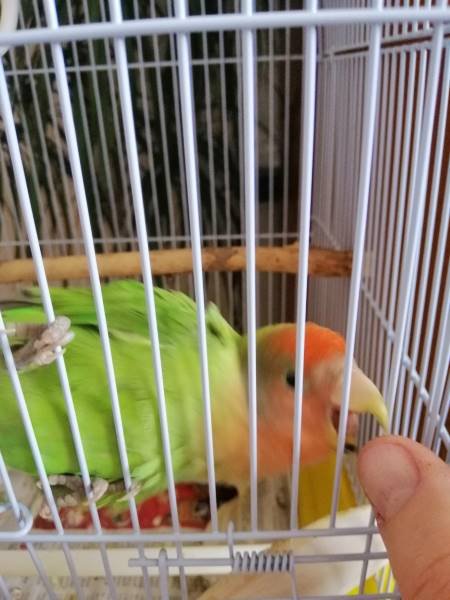
However, this kind of biting behavior should not be confused with the biting behavior adopted by an extremely bored and lonely lovebird or by the bird that is untamed or lacks the bond with his human. Such kind of behavior needs correction.
Helpful tip: Though the biting behavior of lovebirds during the breeding season goes away as the season ends, one might try to make the times better for the bird by making nights longer by covering the cage. Also, cover the hand with a towel while handling the bird if he tends to bite hard.
Summing Up
Behavior is specific to lovebirds, just as it is to humans. But as in humans, there are a few generalizations, the abovementioned behavioral traits are also the ones that, more or less, apply almost to the majority of the lovebird species. Thus, this behavioral trait-list must not be thought to be all. Since every bird is unique, his behavior might be unique too. Also, not every lovebird would behave similarly in a similar situation. Say, if my lovebird chews a lot in boredom, my friends’ bird might scream/growl. Thus, it is best to spend time with your pet to know the ‘how’ and ‘why’ behind his behavior.
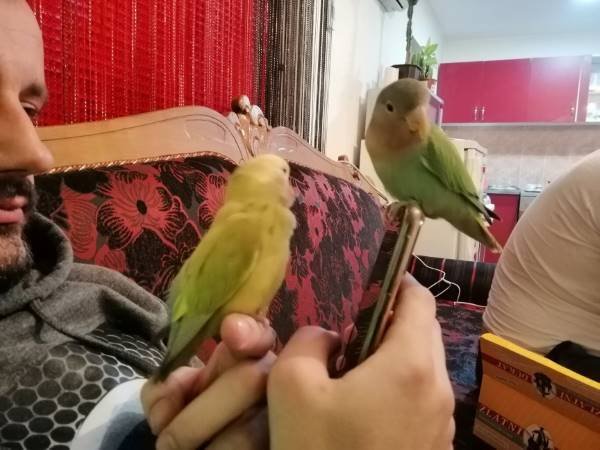
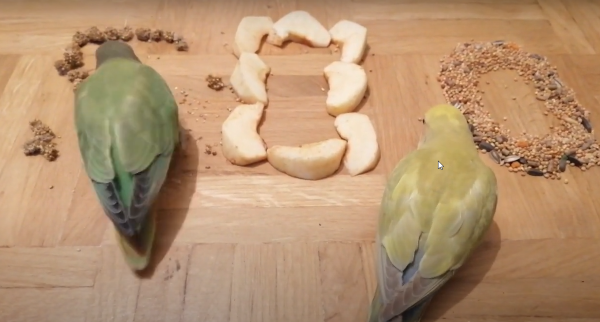
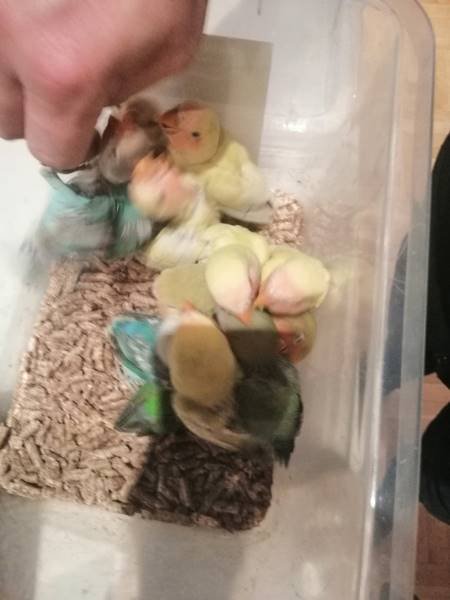
My lovebird has become very quiet and doesn’t play anymore. I take her out every day as usual, but she only wants to cuddle and sleep. Her feathers look good and she is eating and drinking normally. She won’t even play in water anymore. I am very worried, but I don’t have a clue what to do for her. She is about 7 years old any ideas?
Try changing her diet a bit, more vegetables and fruits, pellets. if everything is as usual except sleeping it is hard to tell. Is it a male or female!? Hope everything will be fine with your birdie and it is just something temporary.